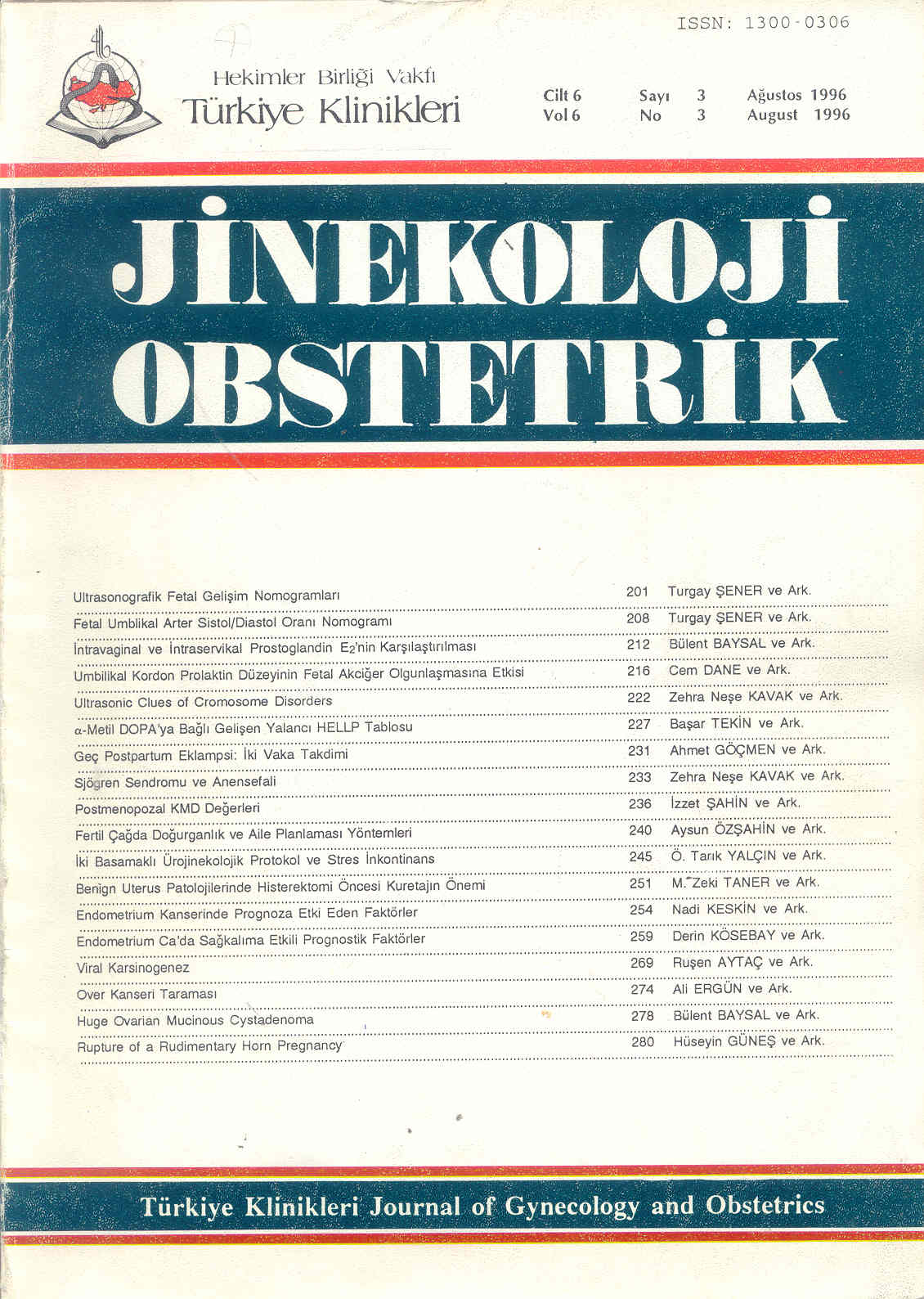Open Access
Peer Reviewed
ARTICLES
3178 Viewed3078 Downloaded
The Evaluation Of Prognostic Factors On Survival And Disease Free Survival In Endometrial Carcinoma
Endometrium Kanserinde Sağkalım ve Hastalıksız Yaşam Süresine Etki Eden Prognostik Faktörlerin Değerlendirilmesi
Turkiye Klinikleri J Gynecol Obst. 1996;6(3):259-68
Article Language: TR
Copyright Ⓒ 2025 by Türkiye Klinikleri. This is an open access article under the CC BY-NC-ND license (http://creativecommons.org/licenses/by-nc-nd/4.0/)
ÖZET
Amaç: Endometrium kanseri olgularında hastalığın seyrini belirleyen prognostik faktörleri belirlemek. Çalışmanın Yapıldığı Yer: İstanbul Üniversitesi Cerrahpaşa Tıp Fakültesi, Kadın Hastalıkları ve Doğum Anabilim Dalı, İstanbul. Materyel ve Metod: Endometrium kanseri tanısı ile opere edilen 136 olguda yaş, evre, histolojik tip, grade, myometrial invazyon, periton sitolojisi, lenf nodu tutulumu değerlendirildi. Sağkalım, hastalıksız yaşam süreleri ile bağımsız prognostik faktörler belirlendi. Bulgular: Log-Rank (Kaplan-Meier) metodu ile yapılan tek değişkenli analizlerde, yaş, histolojik tip, grade, myometrial invazyon, periton sitolojisi, lenf nodu tutulumunun sağkalım süresini belirleyen prognostik faktörler olduğu, hastalıksız yaşam süresini belirlemede ise, yaş, histoloji ve evrenin önemi olduğu belirlendi. Cox-Regresyon modeli ile yapılan çok değişkenli analizde, lenf nodu tutulumunun sağkalım süresini belirlemede bağımsız prognostik faktör olduğu saptandı. Hastalıksız yaşam süresi bakımından bağımsız prognostik faktör saptanmadı. Sonuç: Prognostik faktörlerin tesbiti, endometrium kanserli hastaların tedavisinin yönlendirilmesinde önemlidir. Kötü prognostik faktörlere sahip hastanın yaşam süresinin, iyi prognostik faktörlere sahip olan olgular ile karşılaştırıldığında, anlamlı derecede daha az olduğu görülmektedir.
Amaç: Endometrium kanseri olgularında hastalığın seyrini belirleyen prognostik faktörleri belirlemek. Çalışmanın Yapıldığı Yer: İstanbul Üniversitesi Cerrahpaşa Tıp Fakültesi, Kadın Hastalıkları ve Doğum Anabilim Dalı, İstanbul. Materyel ve Metod: Endometrium kanseri tanısı ile opere edilen 136 olguda yaş, evre, histolojik tip, grade, myometrial invazyon, periton sitolojisi, lenf nodu tutulumu değerlendirildi. Sağkalım, hastalıksız yaşam süreleri ile bağımsız prognostik faktörler belirlendi. Bulgular: Log-Rank (Kaplan-Meier) metodu ile yapılan tek değişkenli analizlerde, yaş, histolojik tip, grade, myometrial invazyon, periton sitolojisi, lenf nodu tutulumunun sağkalım süresini belirleyen prognostik faktörler olduğu, hastalıksız yaşam süresini belirlemede ise, yaş, histoloji ve evrenin önemi olduğu belirlendi. Cox-Regresyon modeli ile yapılan çok değişkenli analizde, lenf nodu tutulumunun sağkalım süresini belirlemede bağımsız prognostik faktör olduğu saptandı. Hastalıksız yaşam süresi bakımından bağımsız prognostik faktör saptanmadı. Sonuç: Prognostik faktörlerin tesbiti, endometrium kanserli hastaların tedavisinin yönlendirilmesinde önemlidir. Kötü prognostik faktörlere sahip hastanın yaşam süresinin, iyi prognostik faktörlere sahip olan olgular ile karşılaştırıldığında, anlamlı derecede daha az olduğu görülmektedir.
ABSTRACT
Objective: To estimate the prognostic factors on survival and disease free survival in endometrial cancer. Institution: İstanbul University, Cerrahpaşa Medical Faculty Department of Obstetrics and Gynecology. Material and Methods: In 136 patients with endometrial carcinoma who were surgically treated and staged, age FIGO stage, tumor histology, grade, myometrial invasion, peritoneal cytology and lymph node status and independent prognostic factors were determined. Results: Univariate analysis showed that age, FIGO stage, tumor histology and grade, myometrial invasion, peritoneal cytology and lymph node status were important prognostic factors on survival, where as, only age, tumor histology and FIGO stage were important parameters influencing disease free survival. Multivariate analysis showed that lymph node status had a significant and independent impact on survival. An independent prognostic factor was not found for disease free survival. Conclusion: To detect the prognostic factors is important for the strategy of the treatment of the patients with endometrial carcinoma. A significant reduction in survival is noted among patients with poor prognostic factors as compared to good prognostic factors.
Objective: To estimate the prognostic factors on survival and disease free survival in endometrial cancer. Institution: İstanbul University, Cerrahpaşa Medical Faculty Department of Obstetrics and Gynecology. Material and Methods: In 136 patients with endometrial carcinoma who were surgically treated and staged, age FIGO stage, tumor histology, grade, myometrial invasion, peritoneal cytology and lymph node status and independent prognostic factors were determined. Results: Univariate analysis showed that age, FIGO stage, tumor histology and grade, myometrial invasion, peritoneal cytology and lymph node status were important prognostic factors on survival, where as, only age, tumor histology and FIGO stage were important parameters influencing disease free survival. Multivariate analysis showed that lymph node status had a significant and independent impact on survival. An independent prognostic factor was not found for disease free survival. Conclusion: To detect the prognostic factors is important for the strategy of the treatment of the patients with endometrial carcinoma. A significant reduction in survival is noted among patients with poor prognostic factors as compared to good prognostic factors.
MENU
POPULAR ARTICLES
MOST DOWNLOADED ARTICLES





This journal is licensed under a Creative Commons Attribution-NonCommercial-NoDerivatives 4.0 International License.










